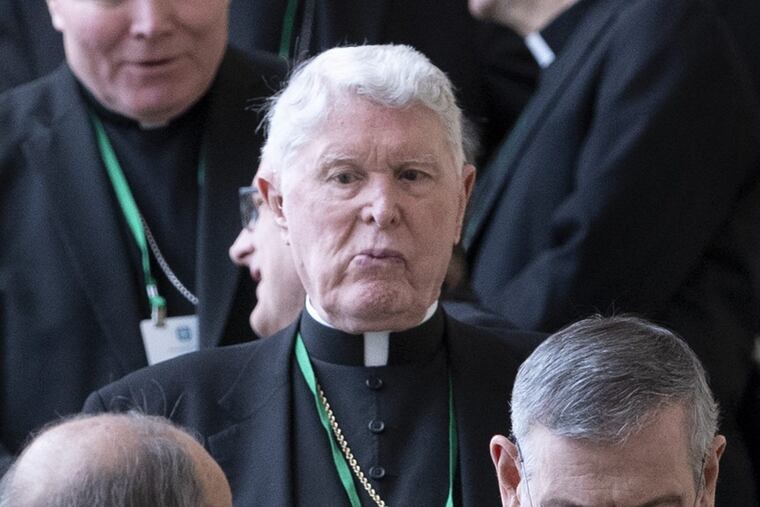Facing Vatican imposed delay, U.S. bishops debate their own accountability
Discussion among bishops Tuesday demonstrated wide agreement that something must be done to better hold themselves accountable, but when it came to determining exactly what, when and why, divisions became apparent.

BALTIMORE – A day after the Vatican derailed plans by the nation's Catholic bishops to endorse broad reforms this week of their handling of sex abuse cases, there was little disagreement that they must do something to increase accountability.
What was missing was a consensus on what, when, and why.
Some members of the hierarchy balked at how rapidly leadership of the U.S. Conference of Catholic Bishops acceded Monday to a Vatican request that they hold off on any binding votes until after a February summit in Rome, where Pope Francis hopes to discuss the clergy sex abuse crisis on a global scale.
Bishop Thomas Paprocki of Springfield, Ill., pressed his colleagues not to leave their fall conference — scheduled to end Wednesday — without something concrete to take back to their dioceses.
"We are not branch managers of the Vatican," he said in a morning session. "Our people are calling out for action."
Others questioned the need for some of the proposals under consideration, which include a new code of bishop conduct and a review board that would give Catholic laity a role in investigating the church hierarchy.
"It seems like we're adding something that doesn't have a particular purpose," said Gerald F. Kicanas, former bishop of Tucson, Ariz.
Even one of the most widely supported measures – establishing a hotline for churchgoers and clergy to lodge complaints against problem prelates – had its detractors.
Bishop Donald Trautman, who was lambasted by a Pennsylvania grand jury in August for mishandling abuse claims in the 1990s as the church leader in Erie, described the idea as "dangerous and unjust."
Conference chairman Cardinal Daniel DiNardo, archbishop of Galveston-Houston, made clear that in deference to the Vatican's request he won't schedule a vote on any of the reform measures before the meeting concludes. But Tuesday's wide-ranging discussion hinted at more fundamental disagreements on the causes of the crisis.
Several younger bishops could be seen shaking their heads as one older colleague blamed the wave of sex abuse on the sexual revolution in the 1960s. Others, echoing calls of a group of conservative activists protesting outside of the conference hotel, blamed what they said was a generation of closeted homosexuals who joined the clergy.
Francesco Cesareo, chairman of the national lay board appointed to advise bishops on sex-abuse policies, described even the measures up for discussion this week as "incomplete."
He cited the Inquirer and Boston Globe report this month that more than 130 bishops – about a third of those still living — had faced accusations of mishandling abuse complaints at some point in their careers.
Trautman urged the bishops not to believe everything they read in grand jury or media reports, a note that earned a round of applause from the room.
Despite the amorphous form of much of Tuesday's discussion, the day offered the first detailed glimpse of how some of the boldest reform measures might work – and exposed what some victim advocates and even some prelates described as obvious flaws.
As they reviewed a proposal that would limit the ministry of bishops forced from their jobs by abuse-related claims or those credibly accused in retirement, a handful of bishops to whom the new policy might apply mingled among the crowd.
Bishop Robert Finn — former head of the Diocese of Kansas City-St. Joseph, Mo., and the only American bishop convicted of failing to report child sex abuse – was there, as was Cardinal Donald Wuerl, who resigned last month amid grand jury accusations he covered up abuse decades ago while leading the Pittsburgh Diocese.
The same Pennsylvania grand jurors also sharply criticized James Timlin, former bishop of Scranton, for his record in handling abuse claims in the 1980s and '90s. Yet he defied a request from that city's current bishop, Joseph C. Bambera, to stay away from this week's meeting.
"While Bishop Timlin has been forbidden from representing the Diocese of Scranton, [his] attendance at conferences is beyond the control of Bishop Bambera," a spokesman for the Scranton Diocese said.
Meanwhile, one line in the current proposal for a civilian-led commission to investigate bishop misconduct raised eyebrows from outside observers. The plan would only grant board members authority to conduct a full investigation — with access to diocesan records — in cases where bishops voluntarily submitted to their scrutiny.
"That would not be acceptable to us," said Regina O'Reilly of Fox Chase, who protested in the icy wind outside with a group of Philadelphia-area parishioners. "They can walk away from it."
Inside, Philadelphia Archbishop Charles J. Chaput, a member of the committee that drafted the review board policy, said he favored a different strategy, too – one that would empower regional archbishops to police the conduct of their neighboring prelates. That change, Chaput acknowledged, would require a rewriting of longstanding Vatican rules.
"Some thought it would be easier for us to implement this independent commission than to change canon law," he said.